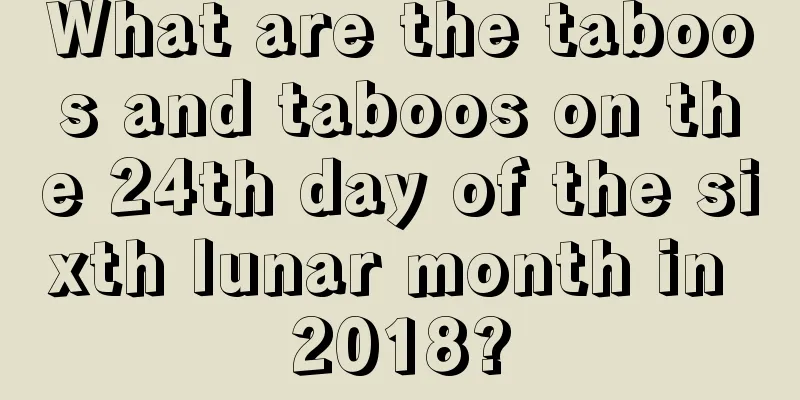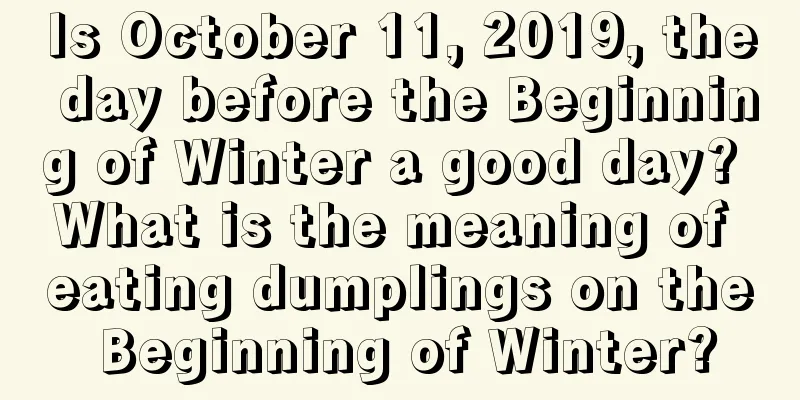Analysis of proverbs about celebrating the New Year in the twelfth lunar month. What are the customs before celebrating the New Year in the twelfth lunar month?

Introduction: Proverbs are a type of orally transmitted phrase with a strong folk cultural flavor, and there are many proverbs and folk songs about the Chinese New Year. So what are the proverbs about celebrating the New Year in the twelfth lunar month and what are the customs before the New Year in the twelfth lunar month? The twelfth month of the lunar calendar is commonly known as "La Yue" among the people. If you want to know more about the twelfth month of the lunar calendar in 2018, please visit Mr. Shui Mo’s website!Analysis of proverbs about celebrating the New Year in the twelfth lunar month!On the 23rd, sugar-coated melons are stuck to the small New Year. On the 24th, the Kitchen God goes to heaven. On the 25th, the house is cleaned. On the 26th, tofu is ground. On the 27th, pork is stewed. On the 28th, fat chickens are slaughtered. On the 29th, dough is fermented. On the 30th, steamed buns are steamed all night.Twist your body on New Year's Day. What are the customs before the Chinese New Year?The eighth day of the twelfth lunar month: drink Laba porridgeLaba porridge is a kind of porridge cooked with a variety of ingredients during the Laba Festival, also known as seven treasures and five flavors porridge. Eating Laba porridge is a tradition to celebrate the harvest and has been passed down to this day. The 23rd day of the 12th lunar month is also known as the "Little New Year", which is the day for the Han people to worship the kitchen god. The Han people have a custom that "men do not worship the moon, and women do not worship the Kitchen God", so worshiping the Kitchen God is limited to men. As the folk song goes, "Zhang, Wang, Li and Zhao, worship the Kitchen God on the 23rd." After eating the sweet melons offered as a worship gift and worshiping the Kitchen God, they will enthusiastically throw themselves into the busy preparations for the New Year. The 24th day of the twelfth lunar month: The custom of "dusting and sweeping the house on the 24th day of the twelfth lunar month" has a long history. It is a traditional custom of our people. In the north it is called "sweeping the house" and in the south it is called "dusting". Every household has to clean the environment, wash various utensils, take apart and wash bedding and curtains, sweep the courtyard, dust off dust and cobwebs, and dredge open and underground ditches. In the north, cleaning the house in the twelfth month of winter means just dusting and sweeping, but in the south, tables, chairs, benches, and even large bunk beds are often carried to the riverside or well to be cleaned. The 25th day of the twelfth lunar month: Grinding tofu on the 25th day, pasting windows on the 25th day In the past, tofu was a must-have food during the Chinese New Year. On the 25th day of the twelfth lunar month, people would grind the soaked soybeans with a stone mill, "knead the foam, sieve it to remove the residue, boil it until it becomes a paste and blocks." After the tofu is made, it is cut into small pieces and stored in clean water with salt for consumption during the Spring Festival. Because the word "fu" in "tofu" sounds like "fu", which sounds like "rich", grinding tofu on the 25th symbolizes a prosperous year and a prosperous life in the coming year. There is also a saying that "paper the windows on the 25th", which means that after sweeping the house on the 24th of the twelfth lunar month, it is time to paper the windows on the 25th. The twenty-sixth day of the twelfth lunar month: "On the twenty-sixth day of the twelfth lunar month, pigs are slaughtered and meat is cut." As the saying goes, "On the 26th day of the twelfth lunar month, kill pigs and cut meat for the New Year." It means that on this day, meat is mainly prepared for the New Year. Killing pigs means killing pigs raised at home; cutting meat means people who do not raise pigs go to the market to buy meat for New Year's meal. The economy of the farming society was underdeveloped and people lived a hard life. They could often only eat meat during the New Year, so it was called "New Year's meat." The 27th day of the twelfth lunar month: On the 27th day of the twelfth lunar month, chickens are slaughtered and the market is held. The twenty-seventh day of the twelfth lunar month is the eve of Chinese New Year. There is a folk saying that goes, "On the twenty-seventh day of the twelfth lunar month, slaughter chickens and go to the market." On this day, every household not only slaughters their own poultry, but also goes to the market and shops to make centralized purchases. Compared with the market on ordinary days where the main purpose is to buy what is in short supply and sell what is in surplus, the market on the 27th day of the twelfth lunar month is mainly for buying and selling New Year items, such as firecrackers, spring couplets, incense and candles, burning paper, beef and mutton, various toys and gifts for children, various head ornaments for girls, etc. On this day, markets everywhere are very busy and lively. The 28th day of the twelfth lunar month: On the 28th day, steamed buns and fried geda Ordinary flour cannot be stored for a long time, but leavened flour is not easy to go bad. On the 28th day, dough is fermented to prepare the staple food from the first to the fifteenth day of the first lunar month. In most places, people rush to prepare steamed noodles for the New Year on this day. People in Taiyuan steam "two baskets of cakes and steamed buns"; people in Hebei steam "jujube flowers" as offerings to their ancestors on New Year's Eve; and people in Henan also steam steamed buns and fry guta on the 28th. Only people in Beijing are a step behind, letting the dough rise on this day and waiting until the 29th to steam the steamed buns. The 29th day of the twelfth lunar month: Little New Year's Eve, steaming buns and burning incense The day before New Year’s Eve is called “Little New Year’s Eve”, when families hold banquets and people visit each other, which is called “saying goodbye to the old year”. Burning incense outdoors is called "Tianxiang" and usually lasts for three days. At the same time, on this day, every household will compete to make noodles. Because neighbors have the habit of exchanging food with each other, the appearance and taste are naturally very particular. New Year's Eve: New Year's Eve New Year's Eve is the time when the old year changes to the new year, and all industries and businesses stop trading. Everyone is making good plans at home, hoping for better luck in the new year. The sound of firecrackers was heard throughout the night. There are also many different activities on New Year’s Eve - putting up hanging scrolls, setting up altars for heaven and earth, saying goodbye to the old year, staying up all night, welcoming the new year... these celebrations follow one after another. When midnight arrives, the twelfth lunar month ends and the new year begins. The new wave of annual fortune in 2019 has already changed. Calculate your own fortune in advance, correct your mistakes if there are any, and encourage yourself if there are none, so that the new year will be smooth and safe. To calculate your new fortune in 2019, please click on the [Premium Calculation] below to learn about your new fortune. I wish you peace and happiness in the new year! |
>>: Is the twelfth month the same as December? Can I get a haircut in the twelfth month of 2018?
Recommend
Is it suitable to raise the beams on August 23, 2019, the day of the Beginning of Autumn? Will the weather still be hot after the end of the dog days in 2019?
Introduction: Generally, it is necessary to choose...
Can I travel on August 24, 2022, the Year of the Tiger?
Choosing an auspicious day before traveling can av...
The direction of the God of Happiness during the Great Cold in 2019. Where is the God of Happiness during the Great Cold?
The proverb "Lesser Cold and Greater Cold, it...
What day is July 24th in the lunar calendar 2018? What month and date is it?
The fiery July gathers the colors of fire; the pa...
Is Easter on April 12, March 20, 2020, an auspicious day for grave repair?
Introduction: According to the traditional customs...
Is it a good day for Xiaoxue on October 8, 2020? Analysis of folk proverbs related to Xiaoxue
Introduction: Every day unfolds differently, and s...
Is it possible to pray for a child during the Minor Snow solar term on October 26, 2019 in the lunar calendar?
Not every lunar calendar day is an auspicious day;...
Can I go out on the night of the winter solstice? Why shouldn’t we go out on the night of the winter solstice?
Introduction: The Winter Solstice is not only one ...
Where is the direction of the God of Happiness on August 29th of the lunar calendar 2019?
Each of us is pursuing happiness in life, and the...
Which positions should be avoided for fish tanks in 2020? Which positions are unfavorable for fish tanks?
The fish tank is a kind of Feng Shui mascot. The m...
What are the taboos on the 22nd day of the first lunar month in 2020?
What are the taboos on the 22nd day of the first ...
Can I move on the fourth day of the fifth lunar month in 2019? Is it a good time to move into a new house?
The fifth month of the lunar calendar is midsumme...
Do rat babies born during the Grain Full solar term in 2020 have good fortunes? Are rat babies born during the Grain Full solar term destined to be rich and noble?
Introduction: Although everyone cannot choose the ...
Is it possible to get married or engaged on the sixth day of the eleventh lunar month in 2017?
In the eleventh month of the lunar calendar, whet...
Where is the position of the God of Wealth in October 2020? Where is the God of Wealth enshrined?
The tenth month in the lunar calendar is named De...









